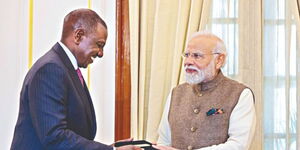A lawyer who represented politician Kenneth Matiba has accused his family of using President Uhuru Kenyatta's name to dupe him of his legal fees.
John Mburu sued Matiba’s widow Edith Wanjiru, daughter Susan Wanjiku and son Raymond Matiba for Ksh234 million, claiming it is his rightful share of the Ksh945 million awarded to the politician by the courts in September last year for torture and illegal detention during the clamour for multi-party democracy in 1990.
Mburu accused Matiba’s family of turning their backs on him and becoming hostile despite the sacrifices he made on behalf of the late politician.
In an affidavit, Mburu claimed: “Since judgment was delivered, the deceased’s family has tormented me, including invoking the name of the President, who they are close to, and trying to use illegal means to have the money paid directly to their account in a bid to deny me what I worked for.”
According to Mburu, Matiba’s family instructed him in 2013 to institute proceedings against the Government for damages arising from his detention in 1990, which led to the deterioration of his health as well as the attrition of his wealth.
The lawyer argued that he spent a lot of hours working on the case at his office, home, libraries and going through newspaper articles to gather evidence, and through his efforts, the award of close to Ksh1 billion, thus justifying his demand for Ksh234,829,522.
“In fact, the family initially had lukewarm interest in the case and gave me little support. It was only after they realised I had built a formidable case that could lead to an award of billions of shillings that they gave me unsatisfactory and poorly coordinated support,” the affidavit stated.
Soon after the judgement was delivered, the family was anxious to have the amount paid, but quickly refused at settling his legal fees, Mburu claimed.
According to the lawyer, the family “became hysterical and highly agitated” during their meetings, while insisting that he accepts a lower fee that he felt was not commensurate with the work he had done for Matiba.
The lawyer argues that despite being close to Matiba as a confidant during the latter’s campaign for the presidency in 1992, the family viewed him as a dishonest person and was openly hostile when Matiba died, forcing him to keep a safe distance.












